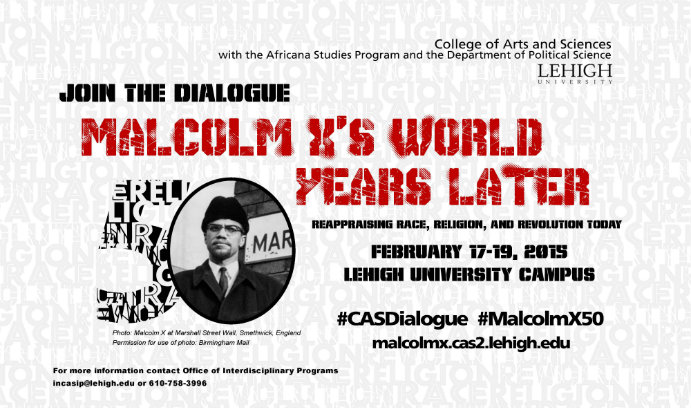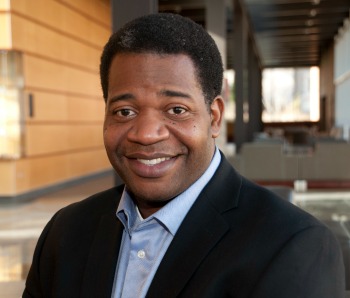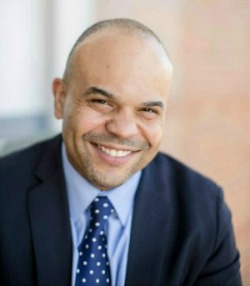Malcolm X’s world 50 Years later

The life and legacy of Malcolm X will take center stage next week as the College of Arts and Sciences, with Lehigh's Africana Studies program and political science department, hosts a three-day conference to commemorate the 50th anniversary of the human rights activist’s assassination.
The conference, “Malcolm X’s World 50 years Later: Reappraising Race, Religion and Revolution Today,” will bring together scholars from around the world next Tuesday, Wednesday and Thursday, Feb. 17-19, for a dialogue on issues that Malcolm X was committed to, including equality and social justice, and that remain timely and relevant.
“When you look at race relations in America and relationships between Americans and American Muslims, or when you look at any range of social justice issues—mass incarceration, inner city violence, all the topical issues—everything that Malcolm X was saying in the 1950s and 1960s is almost applicable to the current moment,” said conference co-chair James B. Peterson, associate professor of English and director of Africana Studies at Lehigh.
“Not only was Malcolm X a figure whose life spoke to the civil rights movement, but he’s a relevant figure today,” said Saladin Ambar, also a conference co-chair and assistant professor of political science. “The idea of scholars coming, not only from the states but from around the world, is to suggest that [Malcolm X] is worthy of study, he’s worthy of research, he’s worthy of being thought of in the context of the most elite academic institutions devoting time and attention to thinking about who he was.”
Controversial and charismatic, Malcolm X was 39 when he was gunned down by members of the Nation of Islam on Feb. 21, 1965, at a rally in New York City, under what remain highly contested circumstances. At the time of his death, he had broken away from the Nation of Islam and had established the Organization of Afro-American Unity.
“We lost one of the most gifted political thinkers, one of the most charismatic and compelling public speakers in the history of America,” Peterson said. “We lost a tremendous amount of momentum in the movement for equality and social justice, and most importantly, when you think about the 21st century, we lost what was probably our best opportunity to have a more holistic and respectful engagement with Islam.”
Keynote speaker will be Michael Eric Dyson, professor of sociology at Georgetown University, who will be joined by Peterson in addressing “Malcolm X’s Influence: 50 Years.” The keynote, which is free and open to the public, will be held at 7 p.m. Tuesday, Feb. 17, at Baker Hall in the Zoellner Arts Center. No registration or ticket is required.
Other speakers and panel discussions are planned for Tuesday, Wednesday and Thursday afternoons. Papers that critically assess Malcolm X’s life and legacy will be presented Wednesday and Thursday morning in the University Center. Registration is required for the conference, which is free to the Lehigh community. (There is a $50 registration fee for those outside the Lehigh community.)
On Tuesday afternoon, the following sessions will be held in the Zoellner Arts Center:
- 1:30 p.m. to 2:30 p.m., Ambar will speak on “Taking Malcolm X Seriously: A View Beyond the Icon.”
- 2:45 p.m. to 3:45 p.m. Omid Safi, director of Duke Islamic Studies at Duke University, will address “America between a Dream and a Nightmare: America, Islam, and the Convergence of Martin and Malcolm.”
- 4 p.m. to 5:15 p.m., there will be a panel discussion with Hisham Aidi, lecturer at Columbia University; Robert Rozehnal, associate professor of religion studies and director of the Center for Global Islamic Studies at Lehigh; and Safi, on “Malcolm and Islam.”
On Wednesday, in the Zoellner Arts Center:
- 1:30 p.m. to 2:30 p.m., Rosa Alicia Clemente, visiting lecturer at the Pan-African Studies Department at California State University, Los Angeles, will speak on "Malcolm X and the Meaning of Activism for Today."
- 2:45 to 3:45 p.m., Pap Ndiaye, professor at the Institut d’Etudes Politiques de Paris, will address "Malcolm X and Paris: Looking Back, Looking Forward."
- 4 to 5 p.m., historian and novelist Tariq Ali will address "Radicalism in the 21st Century: How has the Left Coped with the Triumph of Capital in the Last Decades of the Last Century?"
- 5:15 to 6:30 p.m., there will be a panel discussion with Ali, Amba and Ndiaye, and Amardeep Singh, associate professor of English at Lehigh, on "International Perspectives."
On Thursday, in the Sinclair Laboratory auditorium:
- 1:30 to 2:30 p.m., Carolyn Rouse, professor of anthropology at Princeton University, Reading Malcolm X from the Caves of Tora Bora: Reinterpreting a Global Icon at the End of History.”
- 2:45 p.m. to 4 p.m., a panel discussion with Peterson, Ambar, Singh and Monica Miller, assistant professor of Religion Studies and director of Women, Gender and Sexuality Studies at Lehigh.
“This conference is situated within the context of the various commemorations over the last several years about important milestones in black history—the Voting Rights Act, the Civil Rights Act, the 50th anniversary of Martin Luther King’s ‘I Have a Dream Speech,’ ” said Peterson. Malcolm X, he said, must be included among the prominent figures of the civil rights era to be commemorated in American history.
To say that Malcolm X was misunderstood would be an understatement, said Ambar,author of Malcolm X at Oxford Union: Politics in a Global Era. He is hoping the conference will prove transformative for attendees, especially in regard to what people know—and what think they know—about Malcolm X.
Keynote talks will be live streamed, and people will be able to join the conversation at #CASDialogue and #MalcolmX50.
Also in conjunction with the conference, actor Leland Gantt will appear in “Rhapsody in Black,” a one-man show that explores Gantt’s personal journey to understand and eventually transcend racism in America. The free performance, which is open to the public, will begin at 7:30 p.m. on Thursday, Feb. 19, in Baker Hall as part of The Notation Series.
Other partners of the three-day conference include Lehigh's Office of Research and Graduate Studies, The Council for Equity and Community, Center for Global Islamic Studies, Humanities Center, Global Studies, Department of English, Department of Religion Studies, Department of Journalism and Communication, Creative Writing Program, Department of History and the Women, Gender and Sexuality Studies.
Story by Mary Ellen Alu
Posted on:



